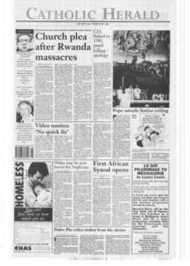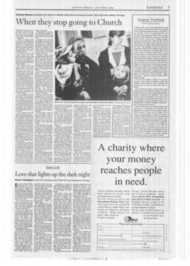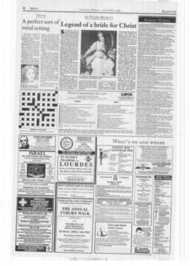Page 6, 15th April 1994
Page 6

Report an error
Noticed an error on this page?If you've noticed an error in this article please click here to report it.
Tags
Share
Related articles
A Hymn To Mary
Leading Catholic Academic Dies At 86
Father John's Update
Taking The Way Of Rite
Denied On The Grounds Of Biology
Among the outward, visible signs...
• • •
Catholic anthropologist Professor Mary Douglas talks to Lucy Lethbridge about the importance of symbol, ritual and religious belief in all human communities.
PROFESSOR MARY DOUGLAS vigorously defends the ;earthy vitality and centrality of ieligious faith: "popular piety comes from up from the grassroots" she says with characteristic enthusiasm.
As an anthropologist, the study of popular piety. in diverse cultures is a source of endless fascination. And for a committed cradle Catholic like Douglas, belief is reinforced and inspired by an understanding of the beliefs of other cultures.
But in an academic discipline pursued with painstaking objectivity, religious faith be perceived as something of an anomaly, even an embarrassment by other anthropologists. Looking back over her long and immensely distinguished career, Douglas says: "I was always wondering if anthropology was a challenge to belief".
"I felt I was politically incorrect as an anthroplogist at college, way before the term political correctness had been invented, simply because I was a Catholic" she says, "I was conscious of being judged before I had spoken."
Once, she recalls, she was called to dine in the Oxford rooms of an eminent and elderly lady biolologist. In the course of dinner, Mary Douglas was asked for her opinions on the Virgin Birth. When she told the assembly that she was Catholic, the lady anthropologist "put down her knife with a clatter and said 'You're a Catholic? when one hears that in this college one's mouth goes dry".
Being Catholic is a help though when it comes to understanding the intricacies of ritual and symbol, the external signs of internal belief: "In religion, I only know what I know because of tradition, authority and revelation."
And Catholicism has the added advantage of running alongside received secular wisdoms but always with its own particular slant, its quirky, and, to some, paradoxical aspects.
"One is always counter-cultural as a Catholic" Professor Douglas maintains, "and the great thing about being Roman Catholic is one can be anticlerical which agnostics never understand."
Now in her early 70s, her professional life has been dedicated to exploring the richness and subtlety of different systems of belief, what they tell us about specific communities and what they tell us about our own community.
She has attempted in her work to see these systems as they are, not to attempt to remove them into some drily logic-chopping explanation. "Ritual is a form of articulation, a way of holding on to the past" says Douglas.
'We should not suppose that in cataloguing the full spiritual population of the universe we have necessarily caught the essentials of religion.' Purity and Danger In Purity and Danger (1966), Douglas looked at what cultures attempt to leave outside their boundaries, at the concepts of pollution and taboo. In a chapter entitled "The Abominations of Leviticus" she examined the dietary rules outlined in Leviticus Why were the early Israelites so hung up on about what they could or couldn't eat? Why were they allowed to eat frogs but not rock badgers?
Douglas rejected the notion that the rules were made by priestly law-makers or that the animals mentioned were allegories of the vices and virtues. Now she is not at all sure if uncleanness is the right meaning. For her, the banned foods could be interpreted as animals that fall "outside" classification or that,
In some way, do not possess all the characteristics required by the environment. And there is much in the dietary taboos, says Douglas now, that can tell us about Old Testament attitudes towards the "dysfunctional" elements in their own society. Towards the lame, the beggar and the stranger.
Mary Douglas concluded the chapter by reflecting on the importance, for the Old Testament Jews, of establishing a code for wholeness, for purity: "The dietary laws would have been like signs which at every turn inspired meditation on the oneness, purity and completeness of God".
For her latest foray into the Old Testament, she gets to grips with what has been dismissed as the "junk room of the Bible", the Book of Numbers an inpenetrable and seemingly incoherent hotch-potch of lists, fragments of lore and rabbinical edicts. But after six years work, it is to Mary Douglas "a masterpiece of literary construction".
As an anthropologist, she knows the
Importance of lists, even the most apparently mundane and everyday Ems carry a pattern: "Take the laundry list" she says excitedly, "with its classes of whites, its silks and wools to be washed separately, it is full of structures".
In a vastly complicated, fascinating scholarly process, Mary Douglas has arrived at a theory that the Book of Numbers is governed by a complex internal logic that tells us much about the Hebrew community of the Old Testament.
"If you are looking for narrative, the Book of Numbers is disorderly, but if you think of literary form, it becomes very familiar" she says. "Books have flashbacks and so on. In Numbers, the first bit holds you in suspense and presents you with riddles that then get answered in the final bit."
And to the last, she stresses the vitality of religious faith in all its various forms: "It's no big deal being monotheistic, masses of cultures are monotheistic".
blog comments powered by Disqus











